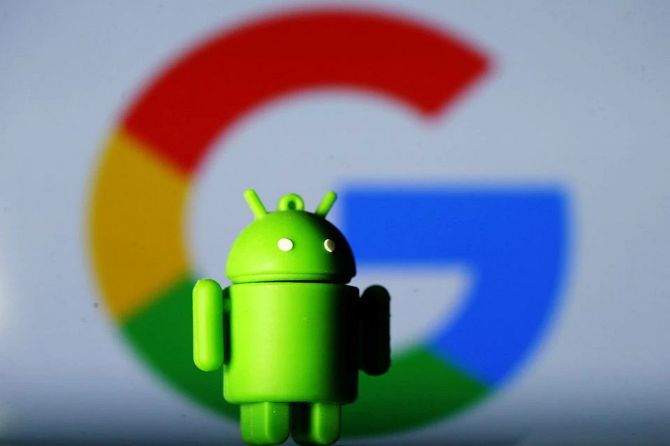Google has termed as "tainted" the investigations done against it by CCI, contending that the two informants on whose complaint the fair trade regulator has initiated the enquiry were working at the same office that was investigating the tech major.

This was "against the principles of natural justice", Google said in the petition filed before the National Company Law Appellate Tribunal (NCLAT), adding the Competition Commission of India (CCI) should have refrained from initiating an investigation based on a complaint filed by their own employees.
"At the very least, the Commission could have debarred the Informants from working in the DG office while the investigation was ongoing, to ensure that the investigating officer was able to impartially assess the case without any influence, such that no concerns could arise on the independence of the investigation," said Google.
On October 20 last year, CCI slapped a penalty of Rs 1,337.76 crore on Google for anti-competitive practices in relation to Android mobile devices.
In the October ruling, CCI had also ordered the internet major to cease and desist from various unfair business practices.
This was challenged by Google before NCLAT, which is an appellate authority over the CCI against any direction issued or decision made or order passed by the regulator.
According to Google's plea, CCI has failed to conduct an "impartial, balanced, and legally sound investigation" while ignoring evidence from Indian users, app developers, and OEMs.
Challenging the CCI order, Google said the findings are "patently erroneous and ignore" the reality of competition in India, Google's pro-competitive business model, and the benefits created for all stakeholders.
"The Impugned Order is fraught with substantive, analytical, and procedural errors including inter alia ignoring exculpatory evidence, statements from Indian OEMs and developers, the Director General's (DG's) copy-pasting of conclusions from decisions of foreign authorities without any application of mind.
"These errors led the Commission to make perverse and incorrect findings," it said.
Google claimed the DG copy-pasted extensively from a European Commission decision, deploying evidence from Europe that was not examined in India or even on the Commission's file.
"There are more than 50 instances of copypasting enclosed," Google pointed out.
The company also questioned the calculation of the penalty amount of Rs 1,337.76 crore, saying that it was on Google's total revenue from its entire business in India and CCI has "committed several legal errors" in doing so.
"The Commission imposed a disproportionate and excessive penalty, contrary to established principles of competition law," Google said.
It has also raised the issue of the absence of a judicial member at CCI and said, a final decision should only have been passed in this case by a quorum which includes a judicial member.
In its plea, Google asserted that its mobile app distribution practices are pro-competitive and not unfair or exclusionary.
When a user buys an Android phone, it already comes with some apps pre-loaded and the user can download more apps.
Google emphasised that Mobile Application Distribution Agreement (MADA) is optional, voluntary and royalty-free, and so it cannot be said to be "imposed" on OEMs (Original Equipment Manufacturers).
It also claimed that the Commission has ignored its evidence that OEMs pre-install competing apps.
In 2020, OEMs pre-installed an average of 38 non-Google apps per device in India, that is about 75 per cent of pre-installed apps per device.
"Evidence submitted by Google demonstrates that OEMs frequently place third party apps, including apps that compete with Google's, prominently on devices' default home screens," it argued.
Indian consumers are "shrewd mobile users" and use the apps they prefer, irrespective of which apps come pre-installed on their devices.
"Google's compatibility measures are necessary for the Android ecosystem and do not inhibit innovation," it added.
The CCI order completely "undermines" public interest, user safety and privacy for Indian Android users, and is "detrimental" to app developers and OEMs.
The directions of the order that require the company to not restrict the ability of app developers to distribute their apps outside of app stores "threatens" Google's ability to show appropriate warnings to users about the risks associated with sideloaded apps, it said.
The order hurts public interest and "would risk increasing device prices for Indian users, harming app developers and thwarting competition".
Google contended that for the Commission to direct such "drastic" remedies, it had to establish that its interventions were justified.
In particular, it needed to verify its suspicions and beliefs by undertaking a fulsome investigation, grounded in evidence, before unpicking a business model that has delivered extraordinary benefits to the thriving Indian mobile sector.
"It did none of those and merely speculated harms," Google submitted.
Google added that "the Commission contradicts itself multiple times throughout the impugned order."
It alleged that the Commission endorsed the DG's baseless conclusions by reference to an errant investigation.
"In particular...No credible market participants were asking the Commission to intervene, or even complaining about Google's conduct," it said.
Since the said order was issued, numerous developers have contacted Google expressing their dismay at the Commission's chosen directions, it further said.











 © 2025
© 2025